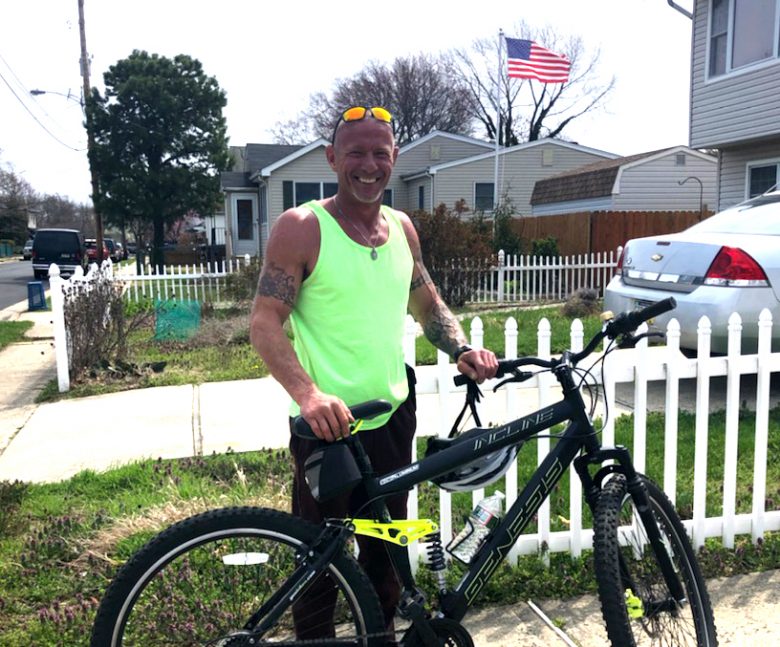
Novel Coronavirus (COVID-19)
Learn about novel coronavirus (COVID-19), our preparedness and updated policies to protect our community, patients, and staff. Learn more here.
Emergency
570-253-8141
Patient Room:
570-253-8609
When prompted enter 3-digit room number
Human Resources
570-253-8995
Wayne Memorial Hospital
601 Park Street
Honesdale, PA 18431
Click the map below for turn by turn directions.

(Honesdale, May 17, 2021)… It was said partially in good humor—“One day I was Superman, now I’m mortal.” But Dennis Knapp, 50, of North Middletown, New Jersey, said having a stroke scared him so much that he knew he had to make some changes in his life. After treatment at Wayne Memorial Hospital and Geisinger-Wyoming Valley, Knapp gave up smoking—he had been up to almost two packs a day—and bought a motorcycle helmet, something he eschewed before. Knapp shared his story with Wayne Memorial Hospital to cast a light on stroke during May, Stroke Awareness Month.
Knapp’s stroke happened on Saturday, March 27th, 2021, in Honesdale where he was visiting his fiancé. He was familiar with the area, as his brother had a home in Lake Wallenpaupack. “I was outside and went to pick up a piece of paper on a small incline when all of a sudden I got so dizzy I could barely stand up. I was sweating and spinning.”
He tried to call his fiancé but her phone was off so he “crawled back to the house and threw my phone at the door.”
His fiancé eventually answered him and helped him get into bed, where he stayed for two hours in the middle of the afternoon. When he woke up, he couldn’t move his right side at all and he had speech difficulties. “I thought I was talking but she said no, you aren’t.” He didn’t want her to call 911, but she did—“and thank God she did,” he said later, “her quick thinking made a big difference!”
At Wayne Memorial Hospital, a certified primary stroke center, the Stroke Alert Response Team was waiting for him. Following all protocols, the staff sent him to Radiology for a CT scan immediately. It was determined that he was a tPA candidate. Tissue Plasminogen Activator is a “clot busting” drug which Wayne Memorial’s Emergency Department is authorized to administer. It has to be given within three- to-four-a-half hours after onset of symptoms.
“I blacked out for a while so I don’t know all that happened,” said Knapp.
A plumber by trade and a father of four, Knapp was airlifted to Geisinger Wyoming Valley where they performed a catheterization through his wrist to “remove the rest of the clot,” Knapp explained.
Knapp said he had been having episodes of vertigo the weeks prior to the stroke, but it was diagnosed as just that and no more. But he also had a family history of stroke. His father died at age 63, he said, after many heart problems and nine strokes.
Shortly after he was discharged, Knapp called Wayne Memorial and talked to Registered Nurse Anthony Maloney, who works in the Emergency Department.
“Mr. Knapp called today and extended his heartfelt gratitude to all of the staff for everything they did to save his life on that day,” Maloney wrote in an email to Administration. “He was full of gratitude and was tearful in his many thanks to each and every one of us who helped on that day. He advised that he is now recovering at home and is able to stand, walk and speak normally again.”
Maloney added that that “hearing the joy and gratitude in Mr. Knapp’s voice tonight made me proud to be an employee here and to be part of a great team.
Director of Patient Care Services James Pettinato, RN, said this story wouldn’t have had the same outcome five years ago.
“Routine care without a process to seek timely treatment would have left this approximately 50 year old with a poor life expectancy and extreme disability,” said Pettinato, “the drug, tPA has been around for a long time, but it took coordinating those efforts for quick diagnosis and treatment under the primary stroke center guidelines to make a difference.”
Knapp said he was told the timeliness of his care saved him possibly from a life of paralysis. “Wayne Memorial really saved my life,” he said, “and I want to share my story to give others hope.”
If you or somebody you know experiences the signs of stroke, call 911 immediately. Think of the FAST acronym: Facial drooping, Arm weakness, Speech difficulty = Time to call for help!
Visit Certified Primary Stroke Center | Wayne Memorial Hospital (wmh.org) for more information about strokes.